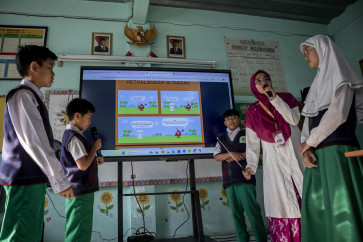What BI watchers should know about Perry Warjiyo
On July 15, 2013, I opened my cell phone to text Bank Indonesia (BI) Deputy Governor Perry Warjiyo
Change text size
Gift Premium Articles
to Anyone

O
n July 15, 2013, I opened my cell phone to text Bank Indonesia (BI) Deputy Governor Perry Warjiyo. I was a journalist covering the central bank and that morning, the rupiah had weakened to Rp 10,024 per US dollar. It was the first time in four years that the rupiah rate onshore was quoted in five digits, after it had hovered at around Rp 9,900 per dollar for weeks, supported by heavy intervention from the central bank.
In fact, BI had burned US$7 billion of foreign exchange reserves the previous month as it tried to prevent the rupiah from breaching the Rp 10,000 per dollar psychological threshold.
In his reply, Perry commented that the central bank decided to float the exchange rate to stabilize the economy. But it was his next explanation that might have defined his viewpoint on monetary policy: he expected the rising trend of interest rates would stop under his watch (at the time, the BI rate had just been jacked up by 75 basis points in two months).
“Going forward, the BI rate has the possibility of going down, not up, if inflation returns to its normal path in September,” he wrote to me in a text message back then.
Inflation did indeed return to its normal path in September, but the lower benchmark BI rate that Perry envisioned did not materialize. Clearly, Perry’s low interest-rate policy stance was opposed by BI Governor Agus Martowardojo, who would hike interest rates aggressively from 6.5 percent to 7.75 percent within a year.
Agus’s policy stance promotes financial system stability, and he has since won acclaim from international fund managers. However, domestic businesspeople and the real sector are still feeling the pinch of the move, which was once described by Bisnis Indonesia daily as an “overdose” of monetary policy tightening. Lending rates skyrocketed and remain high today, despite BI trying to turn the situation around by actively loosening monetary policy.
Soon, however, Perry would have the opportunity and full authority to promote his low interest-rate and growth-oriented agenda. To the market’s surprise, he became the sole candidate President Joko “Jokowi” Widodo proposed as BI governor for the 2018-2023 term to replace the incumbent, Agus.
The son of a modest farmer in Sukoharjo, Central Java, who rapidly rose through the BI ranks, Perry has carried out extensive research on the transmission or link between monetary policy and the real sector, including the impact of agricultural credit to farmers.
This was a stark contrast to the Amsterdam-born Agus, who spent most of his career in the banking sector and has seen the world mostly through the financial market’s perspective.
It’s easy to surmise that the President’s nomination of Perry, who holds a doctorate degree in monetary economics from Iowa State University in the United States, could have been suggested by Coordinating Economics Minister Darmin Nasution, who was BI governor from 2010 to 2013.
It has become public knowledge that while at the central bank together, Darmin and Perry were close confidants who shared similar monetary policy views. In contrast to Agus, who is famous for being hawkish, Darmin and Perry have always been known for being “dovish” — a term referring to a central banker who favors low interest rates to stimulate the economy.
When faced with the challenge to cool down the economy, Darmin and Perry have always pushed for macro-prudential policies, instead of taking the easy way out by hiking interest rates. Perry, in particular, had frequently warned that interest-rate tightening should always be the central bank’s last resort, given its across-the-board negative repercussions for the domestic economy.
In fact, Perry was the chief designer of many of BI’s macro-prudential policies, including the loan-to-value (LTV) ratio. Under his current watch, it is being expanded into a “spatial and targeted LTV”, and BI plans to apply a different formula of ratios depending on the consumer’s area of residence and income profile.
Perry was also the brains behind the foreign exchange swap monetary instrument and the Jakarta Interbank Spot Dollar Rate (JISDOR). First introduced in 2013, the reference rate succeeded in boosting the credibility of local rupiah quotes onshore and in curbing overseas speculation, arbitrary practices stemming from the “dual prices” for rupiah rates in Jakarta and Singapore.
But now, amid the tranquil atmosphere in the global financial markets, with the rupiah already becoming more resilient while BI’s foreign currency reserves rise to historic highs, the central bank might be heading toward a completely different challenge.
Going forward, the more pressing priority for BI is how to improve monetary policy transmission in the real sector to spur the economy, generate jobs and cut down poverty levels. So far, BI’s new benchmark 7-day repo rate has been slashed by a cumulative 125 basis points to 4.25 percent, yet lending rates are staying stubbornly high while economic growth remains stuck at the level of 5 percent.
International fund managers, most of who have expected Agus’s reappointment, might be watching Perry’s fit-and-proper test at the House of Representatives with anxiousness.
Indeed, Perry’s dovish reputation could have a negative impact on the stability of the domestic financial system and hence, the value of rupiah-denominated financial assets that foreign investors currently hold.
But if the intention of President Jokowi is to have BI led by a down-to-earth economist who is committed to pushing down interest rates, boosting the effectiveness of monetary policy transmission to the real sector, improving the welfare of local farmers and small businesspeople choked by expensive credit, then Perry could actually prove to be the fittest person for the job.
____________________________________
The writer is a former journalist of The Jakarta Post, who covered the Indonesian central bank. He has a master’s degree in public policy analysis from Peking University, China.









